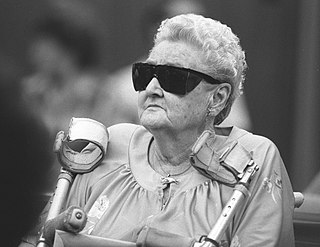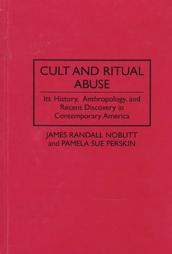Related Research Articles

The Church of Satan (CoS) is a religious organization dedicated to the religion of Satanism as defined by Anton Szandor LaVey. Founded in San Francisco in 1966, by LaVey, it is considered the "oldest satanic religion in continual existence", and more importantly the most influential, inspiring "numerous imitator and breakaway groups". According to the Church, Satanism has been "codified" as "a religion and philosophy" by LaVey and his church. Founded in an era when there was much public interest in the occult, witchcraft and Satanism, the church enjoyed a heyday for several years after its founding. Celebrities attended LaVey's satanic parties and he was invited on talk shows. His Satanic Bible sold nearly a million copies.
The Satanic panic is a moral panic consisting of over 12,000 unsubstantiated cases of Satanic ritual abuse starting in the United States in the 1980s, spreading throughout many parts of the world by the late 1990s, and persisting today. The panic originated in 1980 with the publication of Michelle Remembers, a book co-written by Canadian psychiatrist Lawrence Pazder and his patient, Michelle Smith, which used the controversial and now discredited practice of recovered-memory therapy to make claims about satanic ritual abuse involving Smith. The allegations, which arose afterward throughout much of the United States, involved reports of physical and sexual abuse of people in the context of occult or Satanic rituals. Some allegations involve a conspiracy of a global Satanic cult that includes the wealthy and elite in which children are abducted or bred for human sacrifice, pornography, and prostitution.
The Hugh M. Hefner First Amendment Award is an award created in honor of Playboy founder Hugh Hefner. The Hugh M. Hefner First Amendment Awards were established by Christie Hefner in 1979 to honor individuals who have made significant contributions in the vital effort to protect and enhance First Amendment rights for Americans. Since the inception of the awards, more than 100 individuals including high school students, lawyers, librarians, journalists and educators have been honored.

Lawrence Pazder was a Canadian psychiatrist and author. Pazder wrote the discredited biography, Michelle Remembers, published in 1980, with his patient Michelle Smith, which claimed to detail satanic ritual abuse.

Sybil is a 1973 book by Flora Rheta Schreiber about the treatment of Sybil Dorsett for dissociative identity disorder by her psychoanalyst, Cornelia B. Wilbur.

The McMartin preschool trial was a day care sexual abuse case in the 1980s, prosecuted by the Los Angeles District Attorney, Ira Reiner. Members of the McMartin family, who operated a preschool in Manhattan Beach, California, were charged with hundreds of acts of sexual abuse of children in their care. Accusations were made in 1983, with arrests and the pretrial investigation taking place from 1984 to 1987 and trials running from 1987 to 1990. The case lasted seven years but resulted in no convictions, and all charges were dropped in 1990. By the case's end, it had become the longest and most expensive series of criminal trials in American history. The case was part of day-care sex-abuse hysteria, a moral panic over alleged Satanic ritual abuse in the 1980s and early 1990s.
Laurel Rose Willson was an American con artist and author. She authored books as Lauren Stratford alleging Satanic ritual abuse (SRA), and later assumed the guise of a Holocaust survivor as Laura Grabowski. The general theme of her writing, from adolescence, was horror fiction, often violent and sexual, in which she was the victim.

Michelle Remembers is a discredited 1980 book co-written by Canadian psychiatrist Lawrence Pazder and his psychiatric patient Michelle Smith. A best-seller, Michelle Remembers relied on the discredited practice of recovered-memory therapy to make sweeping, lurid claims about Satanic ritual abuse involving Smith, which contributed to the rise of the Satanic panic in the 1980s. While the book presents its claims as fact, and was extensively marketed on that basis at the time, no evidence was provided; all investigations into the book failed to corroborate any of its claims, with investigators describing its content as being primarily based on elements of popular culture and fiction that were popular at the time when it was written.

The Courage to Heal: A Guide for Women Survivors of Child Sexual Abuse is a self-help book by poet Ellen Bass and Laura Davis that focuses on recovery from child sexual abuse and has been called "controversial and polarizing".

Shirley Ardell Mason was an American art teacher who was reported to have dissociative identity disorder. Her life was purportedly described, with adaptations to protect her anonymity, in 1973 in the book Sybil, subtitled The True Story of a Woman Possessed by 16 Separate Personalities. Two films of the same name were made, one released in 1976 and the other in 2007. Both the book and the films used the name Sybil Isabel Dorsett to protect Mason's identity, though the 2007 remake stated Mason's name at its conclusion.
Cornelia Burwell Wilbur was an American psychiatrist. She is best known for a book, written by Flora Rheta Schreiber, and two television films titled Sybil, about the psychiatric treatment she rendered to a person diagnosed with dissociative identity disorder.
The National Center for Reason and Justice is a United States national non-profit organization disseminating information to the public about claims of injustice in the current criminal justice system and facilitating financial and legal assistance for people the organization considers likely to have been falsely accused or wrongfully convicted.
The Faith Chapel Church ritual abuse case was a case of a developmentally disabled individual charged with child sexual abuse in 1991 as part of the satanic ritual abuse moral panic. After a 9-month trial, the accused was found not guilty by the jury.
Kathleen 'Kee' MacFarlane is an American social worker known for involvement in the high-profile McMartin preschool trial in the 1980s. She was the Director of Children's Institute International. She developed the concept of the anatomically correct doll for children to use during interviews concerning abuse and played a significant role in the McMartin trial. MacFarlane has been criticized for her methods of interrogating small children. Charges against the defendants were eventually dropped.
Thomas Boss Congdon Jr. was an American book editor who worked on Russell Baker's memoir Growing Up, Peter Benchley's bestselling novel Jaws, and David Halberstam's 1986 work The Reckoning, as well as the infamous Michelle Remembers, an unreliable account of child abuse that contributed to the Satanic panic. He ultimately establishing his own publishing house.

Cult and Ritual Abuse: Its History, Anthropology, and Recent Discovery in Contemporary America is a book written by James Randall Noblitt and Pamela Sue Perskin exploring the phenomenon of satanic ritual abuse (SRA). The authors argue that some allegations of intergenerational, ritualized abuse cults are supported by evidence, contrary to most scholars of the subject who regard satanic ritual abuse as a moral panic with no factual basis. Noblitt, a clinical psychologist, is Director of the Center for Counseling and Psychological Services in Dallas, Texas. Perskin is the executive director of the International Council on Cultism and Ritual Trauma and a lecturer on child abuse.
The Country Walk case is a 1985 child sex abuse case which occurred in Florida and was described as a "Multi-Victim, Multi-Offender" case. Francisco Fuster-Escalona, known as Frank Fuster, was convicted on multiple charges and sentenced to a minimum of 165 years behind bars, while his wife Illiana served three years. Appeals courts at the state and federal level have consistently ruled against Frank Fuster.
Hendrika Bestebreurtje Cantwell is a German-born American retired physician, professor emerita of pediatrics at the University of Colorado Denver, advocate for abused and neglected children, and parenting educator. She was one of the first physicians in the United States to work for a child protection agency, serving with the Denver Department of Social Services from 1975 to 1989. Her work there brought her in contact with an estimated 30,000 cases of suspected child abuse and she testified as an expert witness in thousands of court cases. An author of peer-reviewed journal articles, book chapters, and teaching manuals on the detection and treatment of child abuse, she has also conducted workshops and training programs for professionals throughout Colorado. She was inducted into the Colorado Women's Hall of Fame in 1990.
Barbara W. Snow is a practicing therapist based out of Salt Lake City, Utah. She was a central figure in the Satanic ritual abuse moral panic in Utah in the late 1980s and early 1990s.
References
- ↑ John Bartlow Martin Award for Public Interest Magazine Journalism Archived July 20, 2011, at the Wayback Machine , Medill School of Journalism (retrieved February 12, 2012). (Nathan won 1st prize in 1991 for work for The Village Voice .)
- ↑ 2000 AltWeekly Awards, Association of Alternative Newsmedia (retrieved February 12, 2012). (Nathan won 1st place Arts Feature award for an article for the San Antonio Current .)
- ↑ 1998 AltWeekly Awards, Social Reporting, Association of Alternative Newsmedia (retrieved February 12, 2012). (Nathan won 1st place Social Reporting award for an article for The Texas Observer .)
- ↑ "Winners and Judges of the Hugh M. Hefner First Amendment Awards" Archived August 23, 2015, at the Wayback Machine (retrieved February 12, 2012). (Nathan won a Hugh M. Hefner First Amendment Award in 1991.)
- ↑ David Edelstein, "His Father's Son: The haunted men of Capturing the Friedmans." Slate , June 5, 2003.
- ↑ David Folkenflik, "Seizures Hurt Memory, Ex-'Times' Reporter Says", All Things Considered (National Public Radio), October 19, 2007.
- ↑ Shimer College (2000). Shimer College Faculty & Alum Directory 2000.
- ↑ Richard Baron, "Profile: Debbie Nathan" Archived April 28, 2012, at the Wayback Machine , Newspaper Tree (El Paso), February 22, 2004.
- ↑ Debbie Nathan – About The Author Simon & Schuster Official Publishers. Retrieved February 11, 2019
- 1 2 3 Tavris, Carol (October 29, 2011). "Multiple Personality Deception: The famous patient who inspired the panic was more the victim of her psychiatrist than of mental illness". The Wall Street Journal. New York. Archived from the original on November 18, 2015.
- ↑ Edward Wasserman, "Media should exercise caution covering sexual abuse scandals [ permanent dead link ], Sacramento Bee , December 26, 2011.
- ↑ Victor Navasky, "The Demons of Salem, With Us Still", The New York Times , September 8, 1996.
- ↑ "IPT Journal - "Revisiting Country Walk"". Ipt-forensics.com. Retrieved January 14, 2020.
- ↑ Debbie Nathan (March 3, 1993). "The public was shocked. Country Walk parents demanded action. An election was near. Janet Reno was going to send someone to jail. No matter what". Miami New Times. Retrieved January 14, 2020.
- ↑ Terry Ornelas, "Readings", The Austin Chronicle , December 7, 2007.
- ↑ Greg Bak, Review of Pornography. (A Groundwork Guide). Archived April 27, 2013, at the Wayback Machine CM: Canadian Review of Materials (Manitoba Library Association), October 2, 2009.
- ↑ Maia Szalavitz, "The Truth About 'Sybil': Q&A with Author Debbie Nathan". Time. New York. December 28, 2011.
- ↑ Molly Driscoll, ""Sybil" authenticity questioned in new book", The Christian Science Monitor . Boston. October 21, 2011.
- ↑ "Exploring Multiple Personalities In 'Sybil Exposed'", Science Friday (National Public Radio), October 21, 2011.
- ↑ Review of Sybil Exposed, Publishers Weekly , September 19, 2011.